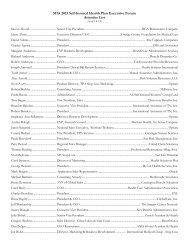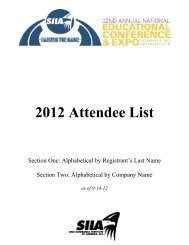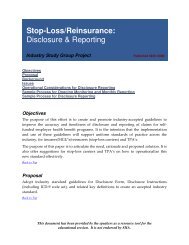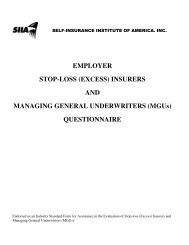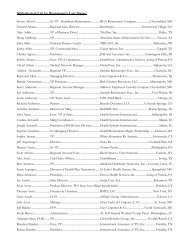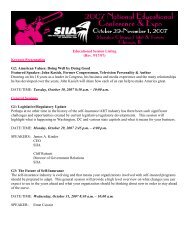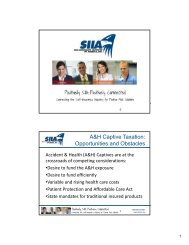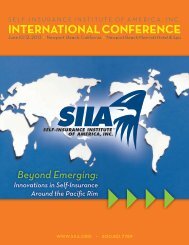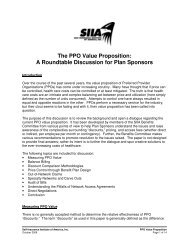SPeaKer - SIIA
SPeaKer - SIIA
SPeaKer - SIIA
Create successful ePaper yourself
Turn your PDF publications into a flip-book with our unique Google optimized e-Paper software.
Presented by:<br />
HealthcareTRack<br />
Continued<br />
Targeting Unnecessary Medical Spend: A Treatment Decision Support Study<br />
According to some reports, up to 30% of care delivered in the U.S. may be unnecessary, and the impact on health outcomes and medical spend is<br />
dramatic. Consumers play a critical role in overcoming this challenge. However, they often lack the support and resources they need to make an informed<br />
medical decision. Treatment decision support programs empower consumers with objective medical information that helps them partner with their provider<br />
to make better decisions, saving everyone health care dollars. In this session, review a new study of national employer groups which demonstrates<br />
the savings generated from treatment decision, discover how key demographic attributes impact consumer engagement in treatment decision support<br />
programs and understand the role treatment decision support programs can play in generating health care value for employers and health plans.<br />
SPEAKER<br />
800.851.7789 | www.siia.org<br />
Thomas Knabel, MD<br />
Vice President of Healthcare Informatics Consulting<br />
Ingenix Consulting<br />
Does Your Self-Funded Health Plan Pass Nondiscrimination Muster?<br />
Identifying and Correcting Potential Tax Issues in Your Plan Design<br />
Although the provisions in Section 105(h) of the Internal Revenue Code – which prohibit offering more favorable eligibility terms and benefits<br />
under a self-funded group health plan for employees deemed “highly-compensated” without adverse tax consequences - have been in place<br />
for decades, these nondiscrimination concepts have received renewed scrutiny with the passage of health care reform and the extension<br />
of Section 105(h) concepts to fully-insured health plans. This session will break down the nondiscrimination requirements of Section 105(h)<br />
applicable to self-funded health plans, as well as review the potential penalties for noncompliance. The session will also offer practical<br />
approaches for identifying and correcting potential nondiscrimination issues. Finally, this session will offer insight into relationship between<br />
Section 105(h) requirements and the extension of these requirements to fully-insured health plans in light of health care reform.<br />
SPEAKER<br />
Catherine Stowers<br />
Senior Attorney<br />
Kreig DeVault LLP<br />
Medical Stop-Loss Market Trends – A Review and Preview<br />
A panel of leading independent stop-loss marketplace analysts discusses major trends witnessed during 2011 and previews what is on the horizon<br />
for 2012. Specific topics will include organic growth, mix of business, claims experience (cat cases, etc.), use of captives, carve outs (transplant,<br />
neonate, etc.) types of networks and network contracting. Session time will be reserved for the panel to take questions from the audience.<br />
SPEAKERs David Wilson Horace F. Garfield<br />
Partner<br />
Windsor Strategy Partners<br />
President<br />
AEGON Alliances, Inc.<br />
Self-Insured Employer Embraces Innovative CDH Strategies<br />
This case study-style presentation will describe how a mid-sized self-insured employer has incorporated and integrated innovative consumerdirected<br />
health care (CDH) strategies, which have produced tangible results as measured by a healthy and productive workplace. Specific<br />
topics will include wellness programs, on-site medical care and disease management approaches.<br />
SPEAKER<br />
Mark Hopkins<br />
Senior Director, Compensation, Benefits & HRIS<br />
Mohawk Industries, Inc.<br />
Leveraging PPO Value for the Self-Insured Employer and TPA<br />
<strong>SIIA</strong>’s Health Care Committee is working to develop recommendations on how to better leverage the value that preferred provider organizations<br />
(PPOs) provide to self-insured employers and their TPAs. This “working” session will provide a forum to present these recommendations and solicit<br />
feedback from attendees in an informal, roundtable-style setting. Based on this dialogue, the association will explore ways to use this information in<br />
a way that will be helpful to employer, TPA and PPO members.<br />
SPEAKERs Representatives of <strong>SIIA</strong>’s Health Care Committee



